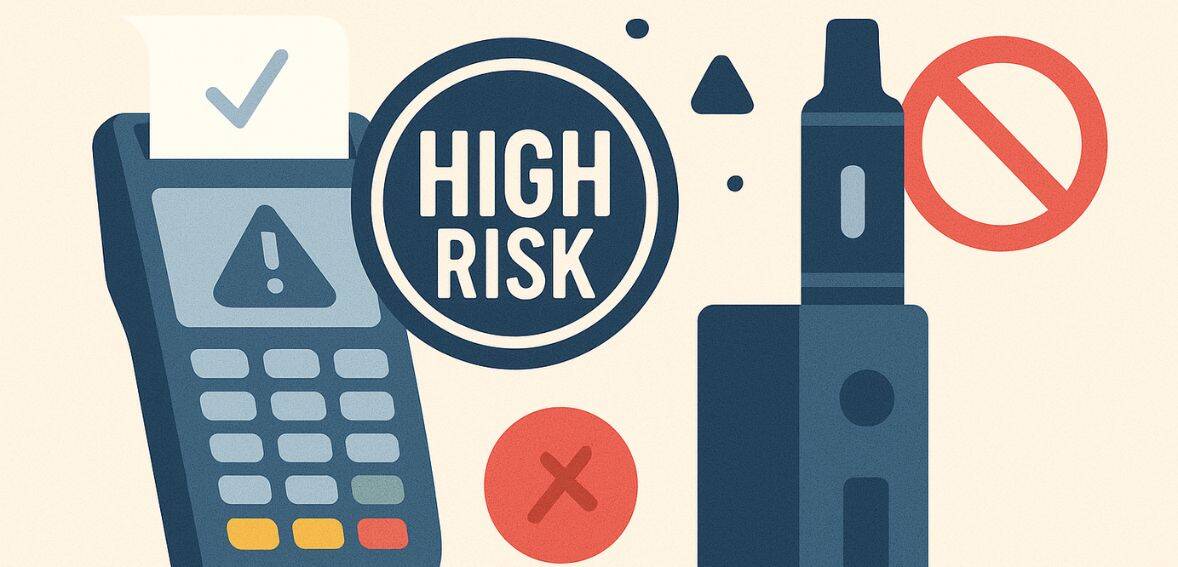
By Nathan Fernandez July 23, 2025
In the current regulatory environment, running a vape shop calls for more than just a strong product line and satisfied customers. It demands meticulous attention to detail, especially when processing payments. Because of regulatory scrutiny, changing compliance requirements, and the association with tobacco-related products, financial institutions frequently classify the vape industry as high-risk. That’s why selecting the right high-risk payment processors for vape shops is not just a choice—it’s a critical business decision. Stability, predictability, and most importantly, avoiding preventable disruptions are key to long-term success.
Understanding the High-Risk Label

For banks and payment processors, “high-risk” does not always imply unclear or immoral. It indicates a higher risk of chargebacks, modifications to regulations, or issues with one’s reputation. Due to state and federal oversight of nicotine distribution, age verification regulations, and product marketing, vape shops are included in this category.
Because of this, a lot of conventional processors either won’t cooperate with vape retailers or, if they do, will charge exorbitant fees and impose stringent requirements. Everything from the underwriting procedure to the time it takes to receive your deposits can be impacted by this label.
Why Mainstream Processors Often Decline Vape Shops

Finding a trustworthy payment processor can be challenging, as many vape merchants discover when they first launch their businesses. Once the processor flags the business model, they may be abruptly dropped from well-known mainstream services.
This unpredictability causes abrupt interruptions in the acceptance of payments, which irritates customers and negatively impacts the store’s cash flow. Why? Mainstream processors frequently lack the regulatory infrastructure and risk tolerance necessary to assist companies operating in closely watched industries. Accounts are flagged, examined, and frequently closed after the internal algorithm finds the vape-related keywords or transactions.
The Importance of a Specialized High-Risk Processor
For vape shops, selecting a processor that clearly states that it supports high-risk transactions is essential. These businesses have a thorough understanding of the industry and have designed their systems to address the subtleties of age verification, compliance, and increased chargeback risk.
They provide customized solutions for companies just like yours, including rolling reserves, increased chargeback thresholds, and underwriting guidelines. Consistency is the long-term advantage, even though rates might be a little higher than those of traditional providers. You can concentrate on growing your business rather than worrying about whether your account will be frozen.
Red Flags: What to Avoid in High-Risk Processing
Not every high-risk processor acts in your best interests. Some take advantage of the lack of options available to vape merchants by providing aggressive contract terms, unclear pricing, and delayed funding schedules. Be wary of processors that force you into long-term agreements with excessive termination costs or that don’t give you thorough reporting on fees and transaction information.
Inconsistent communication is another big red flag; if a provider is difficult to get in touch with during the sales process, they’ll probably be unresponsive when something goes wrong. Your evaluation criteria should include transparency and support as non-negotiables.
Fee Structures and Hidden Costs
The high-risk designation often results in slightly higher processing rates for vape merchants, but that doesn’t mean fees should be exorbitant—especially with transparent vape shop payment processing providers who break down costs clearly and offer fair terms. Certain processors add unstated fees under ambiguous headings like “security compliance” or “risk mitigation,” which aren’t specified in your contract.
Others unnecessarily raise monthly fees or inflate transaction costs. It is crucial to understand the entire pricing structure before signing. Request a detailed explanation, and be wary of flat-rate plans that appear straightforward but frequently conceal larger margins in their design.
Underwriting and Application Process
Compared to standard processors, high-risk processors carry out a more thorough underwriting procedure. Additional documentation, such as identification, supplier invoices, business licenses, and even product samples, might be requested. Although this might seem invasive, it’s an indication that a processor is acting legally and seeking to safeguard both your company and its risk exposure.
You are less likely to experience problems later on if they collect more information up front. Be ready, be open, and pick suppliers who are upfront about their needs.
Chargeback Management Tools and Support
Like many other e-commerce products, vapes may have a higher chargeback rate because of customer confusion, fraud, or product quality disputes. A good processor doesn’t just recognize high chargeback risks—it arms you to fight back. Without the right tools, even one chargeback hiccup can cost you money. Features like auto alerts and representation services make a real difference.
Processors who minimize the importance of chargebacks or fail to provide any tools for mitigation are putting your company through needless financial hardship. Look for processors focused on chargeback prevention, not just ones that help after the fact.
Age Verification and Regulatory Compliance
In the vape industry, regulatory compliance is a moving target. The foundation of this duty, particularly for internet sales, is age verification. In order to keep your company in compliance with local and federal regulations, a high-risk processor that serves vape shops will frequently incorporate tools for confirming the age of customers at checkout.
Heavy fines or even the closure of businesses may follow noncompliance with these regulations. It is worthwhile to prioritize your search for processors that actively assist your compliance efforts through updates and integrations.
Funding Times and Cash Flow Management

Consistent cash flow is not only preferred but necessary for vape shop owners to survive. Payouts shouldn’t wait, just as rent, payroll, restocking, and overhead don’t. Funding speed is therefore one of the most important factors to consider when assessing a payment processor. Daily operations may be strained because some providers may hold your money for several days, even though others offer same-day deposits.
However, reliability is just as important as speed. A processor ought to offer a predictable, unambiguous deposit schedule and adhere to it. What should be a routine payment can become a major headache if there are unexpected delays or inexplicable holds that interfere with your ability to meet basic business needs. You need a partner who timing is everything—someone who makes sure your money hits the bank when it’s supposed to, so you can focus on running your shop, not chasing down your funds.
Customer Support That Understands Your Industry

When something goes wrong—and it eventually will—your processor should make things easier, not harder. Whether you’re dealing with a chargeback, trying to hook up your POS system, or facing a compliance issue, vape shops need support that goes beyond the basics. You’re more likely to get that level of support from processors who understand high-risk businesses.
It’s a game-changer when your provider offers 24/7 support and knows what they’re talking about. If every support call sends you to someone clueless about vape industry rules, that’s a red flag—it might be time to look elsewhere.
Long-Term Scalability and Platform Stability
Your payment processor should grow with your business, not hold it back. This means giving you flexible options for both in-store and online sales, working smoothly with the tools you already use, and staying consistently online. Technical hiccups like slow systems or poor integrations frustrate customers and chip away at your bottom line.
Ask about their track record—how often do they go down, and can they really support your business as it scales? If your current setup can’t handle plans like opening new locations or expanding into wholesale, you could be setting yourself up for a costly switch later.
Understanding the Role of Underwriting in High-Risk Approval

Underwriting is one of the most misunderstood parts of applying to a high-risk merchant account. Vape shops must go through a rigorous review process, in contrast to low-risk industries where approval can be almost instantaneous. Business models, chargeback histories, average ticket sizes, compliance records, and even your website for regulatory language are all evaluated by underwriters.
Although it might seem extensive, this is a constructive step that demonstrates the processor’s commitment to both parties’ protection. Companies that are well-prepared—have clear refund policies, accurate financials, and an open online presence—are more likely to be accepted.
Understanding this process upfront allows vape merchants to avoid surprises or last-minute denials. The more organized and transparent you are, the less friction you’ll face, and the faster you can begin processing payments under a stable, long-term agreement designed specifically for high-risk verticals.
Tech Stack Integration Can Make or Break Daily Operations
The last thing vape shops need is a payment processor that doesn’t work with their existing e-commerce tools or point-of-sale system, as they are already balancing compliance, age verification, and inventory control. In addition to offering a payment gateway that can process restricted product categories, a high-risk processor should guarantee simple plug-ins with platforms vape businesses use—like WooCommerce, Shopify (in limited form), or specific types of POS systems designed for smoke shops.
When processors force you to switch systems, increasing downtime and operational hiccups, frustrations frequently start. Even worse, incompatible systems may lead to failed transactions, abandoned carts, or incomplete data. Always confirm ahead of time if the processor supports real-time reporting dashboards, mobile card readers, and APIs.
Daily operations are more efficient when technology is integrated seamlessly, but incompatibilities may disrupt cash flow, inventory control, and customer experience. Frictionless functionality is a must in a highly regulated environment.
Conclusion
Being a vape shop owner and choosing a high-risk payment processor doesn’t mean compromising; rather, it means exercising greater discretion. Finding the most open, accommodating, and sector-aware partner is the aim, not the cheapest one. A processor becomes more than just a vendor when they understand your business model, your regulatory obstacles, and your clientele. They turn into a growth-promoting agent and a buffer against needless disruptions.
It’s worthwhile to take the time to review contracts, contrast suppliers, and pose difficult questions up front. In addition to processing payments, the correct processor can help you strengthen your basis for long-term success.